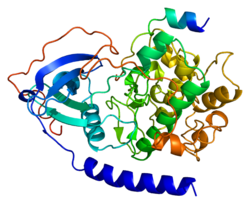The catalytic subunit α of protein kinase A is a key regulatory enzyme that in humans is encoded by the PRKACA gene.[5] This enzyme is responsible for phosphorylating other proteins and substrates, changing their activity. Protein kinase A catalytic subunit (PKA Cα) is a member of the AGC kinase family (protein kinases A, G, and C), and contributes to the control of cellular processes that include glucose metabolism, cell division, and contextual memory.[6][7][8] PKA Cα is part of a larger protein complex that is responsible for controlling when and where proteins are phosphorylated. Defective regulation of PKA holoenzyme activity has been linked to the progression of cardiovascular disease, certain endocrine disorders and cancers.
- ^ a b c ENSG00000288516 GRCh38: Ensembl release 89: ENSG00000072062, ENSG00000288516 – Ensembl, May 2017
- ^ a b c GRCm38: Ensembl release 89: ENSMUSG00000005469 – Ensembl, May 2017
- ^ "Human PubMed Reference:". National Center for Biotechnology Information, U.S. National Library of Medicine.
- ^ "Mouse PubMed Reference:". National Center for Biotechnology Information, U.S. National Library of Medicine.
- ^ Taskén K, Solberg R, Zhao Y, Hansson V, Jahnsen T, Siciliano MJ (Sep 1996). "The gene encoding the catalytic subunit C alpha of cAMP-dependent protein kinase (locus PRKACA) localizes to human chromosome region 19p13.1". Genomics. 36 (3): 535–8. doi:10.1006/geno.1996.0501. PMID 8884279.
- ^ Maller JL, Krebs EG (Mar 1977). "Progesterone-stimulated meiotic cell division in Xenopus oocytes. Induction by regulatory subunit and inhibition by catalytic subunit of adenosine 3':5'-monophosphate-dependent protein kinase". The Journal of Biological Chemistry. 252 (5): 1712–8. doi:10.1016/S0021-9258(17)40606-5. PMID 190238.
- ^ Lester LB, Faux MC, Nauert JB, Scott JD (Mar 2001). "Targeted protein kinase A and PP-2B regulate insulin secretion through reversible phosphorylation". Endocrinology. 142 (3): 1218–27. doi:10.1210/endo.142.3.8023. PMID 11181538.
- ^ Snyder EM, Colledge M, Crozier RA, Chen WS, Scott JD, Bear MF (Apr 2005). "Role for A kinase-anchoring proteins (AKAPS) in glutamate receptor trafficking and long term synaptic depression". The Journal of Biological Chemistry. 280 (17): 16962–8. doi:10.1074/jbc.M409693200. PMC 3923403. PMID 15718245.




